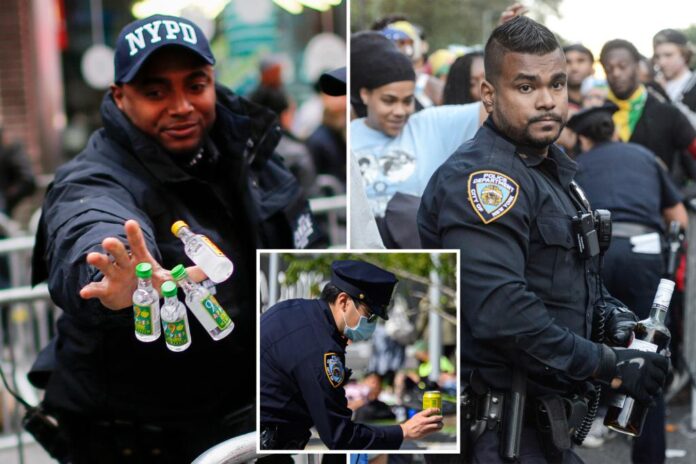Hide your beers when Capt. Buzzkill rolls through — or risk a $25 fine, courtesy of New York’s Finest.
That’s the message from the NYPD, which has issued street drinkers a staggering nearly 10,000 tickets in the past year — more than in the four before Mayor Eric Adams took office combined, according to police data reviewed by The Post.
During the first three months of 2023 alone, cops wrote 2,524 criminal tickets for enjoying a drink in public, six times higher than the number issued over the same period last year, the data analysis shows.
The drink tickets handed out between January and March accounted for nearly 12% of the 21,000 total criminal summonses issued during that time, according to the NYPD statistics.
The department’s hammer-drop on outdoor drinking appears to be part of its renewed promise to tackle quality-of-life complaints, a return to the “broken windows policing” strategy credited with reducing Big Apple crime in the 1990s.
Not everyone was enamored with the cops’ new mission, however.
“We pay city income tax here and what do we get for it? The least we could get is the right to drink in the park without being bothered,” said Jamie Cantwell, a 42-year-old milliner from the Upper West Side who was picnicking with friends in Riverside Park on Sunday.
“I’ve been drinking in parks for many years,” Cantwell added, as she juggled her pet Chihuahua and a cup of rosé. “I think it should be strongly encouraged.”
The NYPD and Adams seem to disagree.
Since Adams took office in January 2022, police have doled out more criminal open container summonses than they did in each of the prior four years combined. Tallies of such tickets for each year from 2018 to 2021 came in at between around 2,500 and 3,400, NYPD statistics show.
Nine out of every 10 tickets issued over the first three months of 2023 were handed to a black or Hispanic person, according to the data.
The highest ticket tally was in the 110th Precinct, whose officers patrol the Queens neighborhoods of Corona and Elmhurst. Cops there issued 237 summonses.
The second highest was in the 73rd Precinct, which covers Brownsville, Brooklyn. Those officers wrote 224, the data shows.
Police sources told The Post that the drink tickets have replaced weed citations as cops’ way to meet unofficial quotas set by the short-staffed department.
“There’s tons of forced overtime [for officers] and, since marijuana is nothing these days, I think cops are making up for it with drinking summonses,” one source said. “People are way more careless these days.”
Another source said the department has moved backward because Adams and the police brass want to focus on “the cowboy style, quality-of-life policing.”
“The pressure is back and cops are conflicted,” the source said. “Supervisors are stopping short of giving numbers, but they make it clear.”

Police Commissioner Keechant Sewell resurrected the old “broken windows” policing tactics last March when, law-enforcement sources said, she told cops to focus on low-level, quality-of-life complaints in the hopes that it will discourage further lawlessness and help fight the city’s surge in crime.
The controversial theory, introduced by social scientists George L. Kelling and James Q. Wilson in a 1982 article, claims that targeting little crimes like public drinking, loitering or vandalism helps halt big, violent crimes by building an aura of order and safety.
But it’s been a mixed bag in the Big Apple, where shootings have dipped slightly over the past year-and-a-half but overall crime remains stubbornly high.
Criminal courts aren’t the only ones inundated because of the public teetotaler push — there were nearly 24,000 civil court summonses for alcohol, the highest number since the 29,000 issued in 2018.
These tickets can’t lead to jail time, and rely on fines instead of warrants to ensure compliance.

This year, cops wrote more than 7,000 tickets between January and March — about 5,000 more than they wrote during the same three-month span in 2022. That’s also about 2,000 more than they wrote in the first quarter of 2018.
A spokesperson defended the NYPD’s anti-booze crusade by pointing to the more than 60,000 calls the department received during the first quarter about alcohol and large parties.
“Quality of life complaints, which are often a precursor to violence, remain a real concern to residents of all city neighborhoods,” the police spokesperson said. “The NYPD will continue to address these conditions as the public demands and expects we should.”
Some New Yorkers supported the strict regulations, though they said the meager $25 fine wasn’t likely to curb drunken revelers.
“It’s better not to have alcohol in general in parks because there are a lot of kids and families – with alcohol it just goes south,” said Anna Domina, a 26-year-old real estate agent from Brooklyn.
“But I think $25 might not be a good deterrent — I think it’s too low, especially for New York,” she added. “If they really want to stop that, they would need to raise that. For sure.”
Keiko Umenura, a 55-year-old accountant from the Upper West Side, agreed.
“It’s necessary,” she told The Post on Sunday. “A lot of people get together, get drunk and start fighting.”
But other New Yorkers swatted away the NYPD’s “silly and petty” strategy.
“Who cares? Who is going to stop drinking outside for $25?” Maria Fontana, 24, told The Post. “Do the math — an $18 cocktail plus tip, versus a $12 bottle plus a $25 ticket. I’ll take the wine and the ticket, and no regrets especially if the weather’s nice.”
“It seems like a waste of police resources, especially with the tickets being only $25,” added Sam Ashley, 33. “It’s not much of an incentive to stop … I think most people would consider that an uncorking fee.”
Additional reporting by Reuven Fenton


